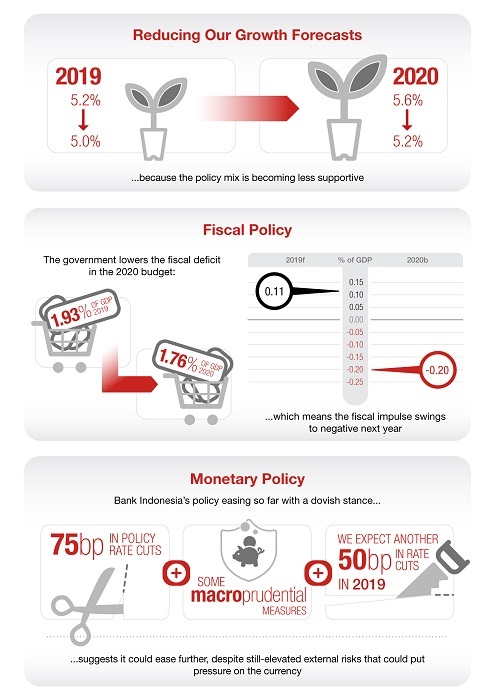Indonesia: The Return of Fiscal Conservatism
- Fiscal policy is expected to turn conservative with the 2020 budget projecting a smaller fiscal deficit
- The lack of fiscal support to growth will likely prompt the central bank to cut rates further at a time when external risks remain elevated.
- We cut our GDP growth forecast to 5.0% from 5.2% for 2019 and to 5.2% from 5.6% in 2020.
We are turning more cautious on short-term policy-related risks. Monetary and fiscal policies have done well in meeting challenges from 2018 and policymakers have gained credibility by keeping a prudent stance. However, in recent months, Bank Indonesia (BI) has aggressively eased monetary policy to support growth momentum. Unfortunately, the external environment remains volatile, and this means BI will need to stay vigilant.
This affects our views on the economic outlook in several ways. We cut our GDP growth forecast to 5% from 5.2% for 2019 and more substantially, to 5.2% from 5.6% in 2020. Our fiscal deficit forecast remains at 2.2% for this year, but is lowered to 2.2% from 2.5% in 2020. We forecast 50bp of further rate cuts by BI in Q4 2019, while we had previously only expected 25bp.
In terms of monetary policy, room for further easing seems limited at this stage. The risk of overdoing the easing cycle could potentially become counter-productive from a growth standpoint, reminiscent of the back-to-back cuts in late-2017. If the currency weakens as a result of narrowing differentials, it will have direct consequences for the real economy, via its negative impact on business confidence and on investment spending.
On fiscal policy, it appears to be turning overly conservative again: the fiscal deficit is set to narrow in 2020, implying less support to growth next year. This is despite the fact that fiscal policy would be the more effective tool in boosting growth with plenty of space to maneuver. This is all at a time of still-high external risks particularly from US-China trade tensions.
Meanwhile, we are closely watching the prospects for reforms. President Jokowi hopes to revise the labor law by year-end. If successful, this could be potentially game-changing as it could boost foreign direct investment, skill formation and formal sector employment, supporting the government’s fiscal position. Infrastructure spending and ease-of-doing-business reforms clearly remain priorities, but the government is also looking at human capital development in an effort to raise productivity growth. Thus, longer-term outlook is more optimistic.
For more insight on our forecast of Indonesia’s monetary and fiscal policies, read the full report here.
Contributor

Euben Paracuelles
Southeast Asia Economist
Disclaimer
This content has been prepared by Nomura solely for information purposes, and is not an offer to buy or sell or provide (as the case may be) or a solicitation of an offer to buy or sell or enter into any agreement with respect to any security, product, service (including but not limited to investment advisory services) or investment. The opinions expressed in the content do not constitute investment advice and independent advice should be sought where appropriate.The content contains general information only and does not take into account the individual objectives, financial situation or needs of a person. All information, opinions and estimates expressed in the content are current as of the date of publication, are subject to change without notice, and may become outdated over time. To the extent that any materials or investment services on or referred to in the content are construed to be regulated activities under the local laws of any jurisdiction and are made available to persons resident in such jurisdiction, they shall only be made available through appropriately licenced Nomura entities in that jurisdiction or otherwise through Nomura entities that are exempt from applicable licensing and regulatory requirements in that jurisdiction. For more information please go to https://www.nomuraholdings.com/policy/terms.html.
